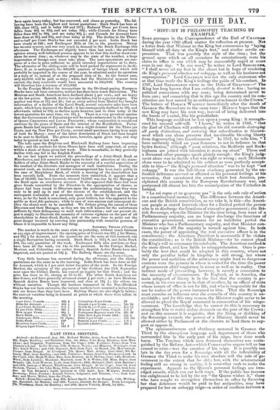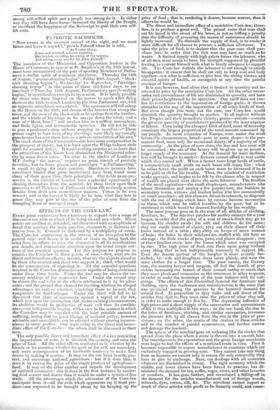TOPICS OF THE DAY.
" HISTORY IS PHILOSOPHY TEACHING BY
EXAMPLE."
SOME passages in the Correspondence of' the Earl of CHATHAM during the year 1766 afford matter for reflection at present. Not a letter from that Minister to the King but commences by "laying himself with all duty -at the King's feet," and similar servile ex- pressions. That was possibly the style of the time; but the ground upon which on all occasions he ostentatiously rests his claim to office is one which may be successfully urged at court even in our day. " In one word," he writes to Lord Busumaix, " I shall never set my foot in the closet but in hope of rendering the King's personal situation not unhappy, as well as his business not unprosperous." Lord CHATHAM was not the only statesman who at that time made the King's feelings the guide of his conduct. In 1767, Lord BARRINGTON wrote to the Duke of GRaFTON—" The King has long known that I am entirely devoted to Mm: having no political connexions with any man ; being determined never to form one; and conceiving that in this age the country and its con- stitution are best served by an unbiassed attachment to the Crown." The letters of HORACE WALPOLE immediately after the death of GEORGE the Second are to the same tune : HORACE hopes that the new King may have his own way, instead of being delivered into the hands of a cabal, like his grandfather. This language could not be lost upon a young King : it strength- ened his natural self-will. " I know," he writes in 1766, " that the Earl of Chatham will zealously give his aid towards destroying all party distinctions, and restoring that subordination to Govern- ment which can alone preserve that inestimable blessing liberty from degenerating into licentiousness." In 1767, he tells him, " have uniformly relied on your firmness to act in defiance to that hydra faction," although " your relations, the Bedfords and Rock- ingham are joined with intention to storm my closet." These and a thousand other passages speak plainly enough : the King's judg- ment alone was to decide what was right or wrong ; such Ministers alone were to be admitted to his cabinet as were perfectly accept- able to him—" the King's personal situation" was to be kept "nor unhappy." It was the full-blown obstinacy generated by the un- limited deference avowed or affected to his personal feelings at his. accession, that occasioned the errors which lost America, pre- cipitated this country in the European Revolutionary war, and postponed till almost too late the emancipation of the Catholics in Ireland.
" Le roi regne et ne gouverne pas" is the only safe rule of action in a constitutional monarchy. The difference between the Ameri- can and the British constitution, as we take it, is this—the Ameri- can people at stated intervals elect for a limited period the person who is to discharge the functions of executive government ; the Bri- tish Sovereign, when the Minister for the time being, from want of a Parliamentary majority, can no longer discharge the functions of executive government, nominates for an indefinite period the Minister who has a Parliamentary majority, and that Minister con- tinues to reign till the majority is turned against him. In both cases, the power of appointing the real executive officer is in the constituency : the American President is answerable if he violate the constitution ; so is the British Minister—for he cannot plead the King's will to extenuate his misdeeds. The American method is the more direct, and less liable to misapprehension. Ours is pro- bably the best that could be adopted in this country, where not only the peculiar belief in kingship is still strong, but where the power and ambition of the aristocracy might lead to dangerous contests were the persons in whom is vested for the time the power of government chief magistrate in name as well as in reality. Our indirect mode of proceeding, however, is merely a concession to the necessity of circumstances. In England, as in America, the main safeguard of liberty is in the fact that the country is go- verned, in his own name or in that of another, by an officer of state whose tenure of office is not for life, and who is responsible for the use he makes of the power intrusted to him. That the Sovereign must exercise an influence over the councils of this country is un- avoidable; and for this very reason, the Minister ought never to be allowed to plead the Royal command in extenuation of his misgo- vernment. The knowledge that he cannot do this is necessary to strengthen him to resist undue demands on the part of the Crown : and on this account it is requisite, that the liking or disliking of the Sovereign towards the person of a Ministry should never be allowed either by Parliament or the electors to lead them to sup- port or oppose it.
The opinionativeness and obstinacy matured in GEORGE the Third by the obsequious language and deportment of those who surrounded him in the early part of his reign, have done much harm. The Toryism which men flattered themselves was extin- guished by the Reform Act—which Conservative organs tell us has ceased to exist—was the creation of his reign. It is possibly too late in the day even for a Sovereign with all the inflexibility of GEORGE the Third to make his own absolute will the rule of go- vernment to the extent that he did ; but, with the aristocratical feeling still so strong in society, it is somewhat rash to make the experiment. Appeals to the Queen's personal feelings are two- edged swords, which can cut both ways. If the public has become too enlightened to be led by the cry "the Queen wishes it," those who have sought to strengthen themselves in office by flattering her that deference would be paid to her antipathies, may have prepared for her an unhappy reign—a series of conflicts between a
strong self-willed spirit and a people too strong for it. In either way they will have done harm—betrayed the liberty of the People, or sacrificed the happiness of the Sovereign to gain their own self- ish ends.



























 Previous page
Previous page